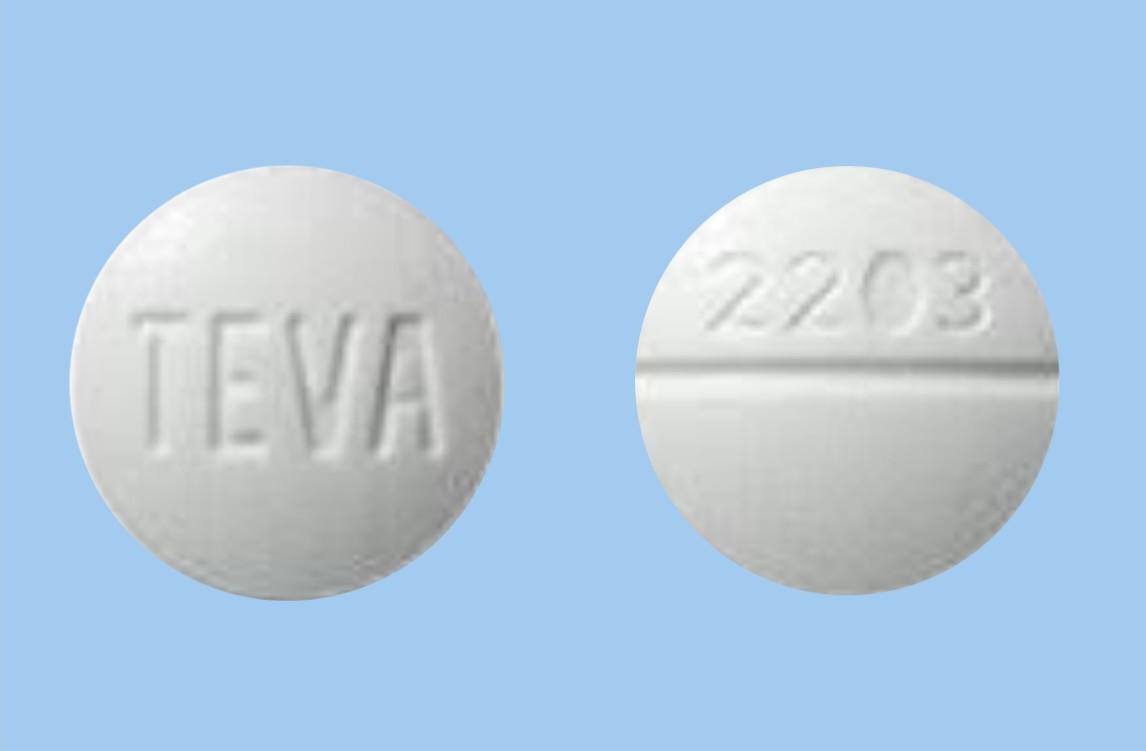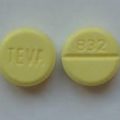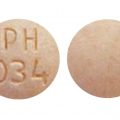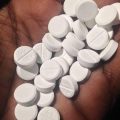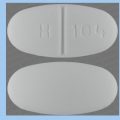The white round pill with the imprint TEVA 2203 has been identified as Metoclopramide Hydrochloride 10 mg. It is supplied by Teva Pharmaceuticals USA. Metoclopramide 10 mg is not a controlled substance under the Controlled Substances Act (CSA).
TEVA 2203 pill is used to treat gastroesophageal reflux disease (GERD) that causes symptoms. GERD occurs when acid flows up from your stomach. This causes heartburn. It may also harm your esophagus (the tube that connects your mouth to your stomach). This drug is used to relieve heartburn and heal sores in your esophagus when other treatments haven’t worked.
TEVA 2203 pill is also used to treat diabetic gastroparesis. Gastroparesis happens when your stomach takes too long to empty its contents. Symptoms may include nausea, vomiting, heartburn, loss of appetite, and feeling full long after meals.
This drug may be used as part of a combination therapy. This means you may need to take it with other medications to treat your condition.
How TEVA 2203 pill works
Metoclopramide belongs to classes of drugs called antiemetics and prokinetics. Antiemetics are used to reduce nausea and vomiting, and prokinetics are used to empty the contents of your stomach faster. A class of drugs is a group of medications that work in a similar way. These drugs are often used to treat similar conditions.
This drug works by emptying the contents of your stomach. It does this by increasing your stomach muscle contractions. This speeds up the movement of food through your stomach and intestines. It also increases the tightness of your lower esophageal sphincter (the muscle connecting your esophagus and stomach). This stops stomach acid from flowing back up to your esophagus.
This drug also prevents nausea and vomiting. It does this by blocking receptors in your body that are responsible for triggering nausea and vomiting.
What are the side effects of TEVA 2203 pill?
Metoclopramide oral tablets may cause drowsiness. Some people may have dizziness, nervousness, or headaches after they stop taking this drug. It can also cause other side effects.
More common side effects
The more common side effects of metoclopramide can include:
- headache
- confusion
- trouble sleeping
- dizziness
- restlessness
- sleepiness
- exhaustion
If these effects are mild, they may go away within a few days or a couple of weeks. If they’re more severe or don’t go away, talk to your doctor or pharmacist.
Serious side effects
Call your doctor right away if you have serious side effects. Call 911 if your symptoms feel life-threatening or if you think you’re having a medical emergency. Serious side effects and their symptoms can include the following:
- Depression and suicide. Symptoms can include:
o sadness
o lack of motivation
o thoughts of harming or killing yourself
- Neuroleptic malignant syndrome (nervous system disorder). Symptoms can include:
o high fever
o stiff muscles
o trouble thinking
o fast or irregular heart rate
o increased sweating
- Tardive dyskinesia, a movement disorder that can be permanent. Symptoms can include repeated, uncontrollable movements such as:
o movement in the face, such as blinking, grimacing, or sticking out your tongue
o slow or fast, jerky movements of the arms and legs
- Parkinsonism (symptoms similar to those caused by Parkinson’s disease). Symptoms can include:
o shaking
o body stiffness
o slow movement
o trouble keeping your balance
o blank stare with an open mouth
- Allergic reaction. Symptoms can include:
o rash
o hives
o trouble breathing
o swelling of your tongue, lips, or throat
- Hyperprolactinemia (increased levels of the hormone prolactin). Symptoms can include:
o menstrual problems or vaginal dryness in women
o erectile dysfunction, decreased body hair and muscle mass, and increased breast size in men
- Hallucinations (seeing or hearing things that aren’t there).
What medications interact with TEVA 2203 pill?
TEVA 2203 pill can interact with other medications, vitamins, or herbs you may be taking. An interaction is when a substance changes the way a drug works. This can be harmful or prevent the drug from working well.
To help avoid interactions, your doctor should manage all of your medications carefully. Be sure to tell your doctor about all medications, vitamins, or herbs you’re taking. To find out how this drug might interact with something else you’re taking, talk to your doctor or pharmacist.
Examples of drugs that can cause interactions with metoclopramide are listed below.
Interactions that increase your risk of side effects from metoclopramide
Taking TEVA 2203 pill with certain medications raises your risk of side effects from metoclopramide. Examples of these drugs include:
- Sedatives, hypnotics, narcotics, antihistamines, and tranquilizers. These include:
o diazepam
o lorazepam
o hydroxyzine
o phenobarbital
o promethazine
o scopolamine
o eszopiclone
o temazepam
o zaleplon
o zolpidem
o meperidine
o propofol
o meprobamate
Taking any of these drugs with metoclopramide may increase drowsiness.
- Monoamine oxidase inhibitors (MAOIs). These include:
o isocarboxazid
o phenylzine
o rasagiline
o selegiline
o tranylcypromine
Taking these drugs with metoclopramide may increase your blood pressure.
Interactions that increase your risk of side effects from other drugs
Taking TEVA 2203 pill with certain medications raises your risk of side effects from these drugs. Examples of these drugs include:
- Tetracycline. Metoclopramide increases how much tetracycline your body absorbs. This may increase your risk of side effects of tetracycline, such as diarrhea and vomiting.
- Cyclosporine. Metoclopramide may increase the levels of cyclosporine in your body. This may raise your risk of kidney problems, digestion problems, and tingling (pins and needles) feeling caused by damage to your nerves.
- Insulin. Metoclopramide affects how food moves through your body. This may change your blood sugar levels. You may have higher blood sugar levels because food is moving through your stomach and entering your bloodstream faster. Your doctor may adjust your dose of insulin.
Interactions that can make your drugs less effective
When metoclopramide is used with certain drugs, it may not work as well to treat your condition. Examples of these drugs include:
- Anticholinergics. These include atropine, benztropine, darifenacin, dicyclomine, fesoterodine, glycopyrrolate, hyoscyamine, methscopolamine, oxybutynin, tolterodine, scopolamine, solifenacin, trihexyphenidyl, and trospium.
- Narcotics (pain drugs). These include codeine, fentanyl, hydrocodone, hydromorphone, meperidine, methadone, morphine, and oxycodone.
When certain drugs are used with metoclopramide, they may not work as well. This is because the amount of these drugs in your body may be decreased. Examples of these drugs include:
- Digoxin. Your doctor should monitor your digoxin blood levels closely.
- Levodopa. Metoclopramide reduces the effect that levodopa has on your body. Your doctor may avoid using this drug with metoclopramide.


